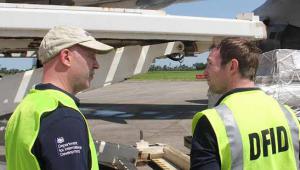The cross-party International Development Committee commended DFID’s efforts once an international public health emergency had been announced, but said it ignored earlier warnings from a small number of actors. As a result, Britain joined the rest of the international community in responding far too slowly to an epidemic that would go on to devastate West Africa.
In a report released yesterday, the MPs wrote: “We are concerned that DFID is still relying too much on improvements to the international system, without improving its own ability to independently assess international public health risks.
“DFID must ensure that it has the ability to listen and react to information and warnings from a range of sources, not just the World Health Organisation, in order to assess the severity of public health and humanitarian emergencies.”
WHO has been widely criticised for being too late in sounding the alarm, waiting until the 8 August 2014 to declare a public health emergency of international concern.
The outbreak began in Guinea with the death of a two-year old toddler in December 2013, and began escalating in February and March the following year. The Guinean government notified WHO on March 23 2014, after which cases initially dwindled leading to a sense the outbreak had subdued, but by June 337 people had died, making it already the deadliest Ebola outbreak in history.
David Nabarro of Médecins sans Frontiéres told the committee that “the global alarm was sounded painfully late” and as a result a “real mobilisation effort did not begin until September 2014, resulting in the loss of a critical time window to prevent the epidemic’s spread”.
The committee said that because the UK waited for WHO to announce an emergency, it missed warnings from other actors, notably Médecins sans Frontiéres, which tried to raise concerns and encourage the mobilisation of resources.
Justine Greening, UK secretary of state for international development, told the committee that the UK “did react quickly”, looking at action on the ground in June and providing initial funding in July.
However it was not until September 2014 that a substantial mobilisation got underway from the UK and elsewhere.
The Ebola epidemic continued for two years, claiming the lives of 11,300 people and infected more than 28,600 in Liberia, Guinea and Sierra Leone only – which were the three countries worst-hit by the virus.
The outbreak also reversed years of development gains, decimated the countries’ economies and devastated public services such as health systems.
Last week, Liberia, Sierra Leone and Guinea were all declared Ebola-free simultaneously for the first time since the outbreak began, however, only hours after the declaration a case of Ebola was confirmed in Sierra Leone.
The MPs are recommending that DFID improve its capacity to quickly and flexibly disburse smaller sums to respond early on to rapidly changing crisis, work to engage with communities as soon as possible in future outbreaks, and lead efforts for radical reform of WHO, including greater funding from its member states.












